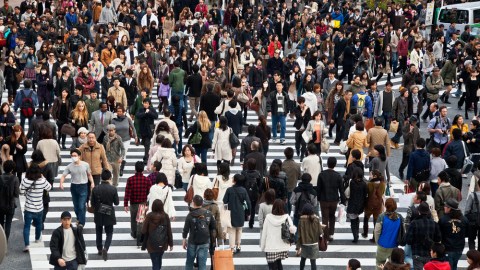Rethinking Population Growth: Would you be better off if fewer people had lived before you?

Population growth is a very real concern. When we were hunter-gatherers we were at five million people on the planet. Now there’s seven billion and we’re headed toward nine billion, maybe even ten billion by the middle of the century. And some environmentalists would say population growth is at the root of all environmental problems and many people would say, “Hey, we have to end it and we have to shrink the population dramatically.”
Well first off, population growth is slowing. In 1950, the average woman on earth had five children over the course of her lifetime. Now the average woman on earth will have about two-and-a-half children over the course of her lifetime. And when that reaches two, that’s the magic replacement rate. And we’re on track to hit that. So by the middle of the century we will have ended population growth, most likely. Now all that having been said, is a smaller population better because human brains are the sources of ideas and ideas multiply all other resources and make your life better?
Ask yourself this. Would you be better off if fewer people had lived before you or if more people had lived before you? If fewer, maybe they would have used up fewer finite resources. But then fewer people would have come up with all these great ideas that enhance your life whether it’s antibiotics or the electric light or the Internet or television or radio or the automobile. All of those came from human minds. So human minds are an ultimate source of wealth in a certain sense, in the same way that human mouths or consumption is a depleter of some resources. So we have to find a balance.
The other very exciting thing is that it’s possible that more people means more innovation even more than it means more consumption. What I mean is twice as many people means twice as much consumption. But it might mean three times as much innovation and we can see that throughout history. If you look at the starting points of different disconnected continents, the ones that started with the highest population, the highest land area, were the ones where the most innovation happened. You look at Eurasia and Africa together as one large land mass. That’s where the bulk of the innovations over the last several millennium came from, up until the time of Columbus when people connected again.
That’s in large part because they started with a larger population. The Americas had stone age technology, agriculture somewhat, but didn’t have the metals or the printing press or the astronomy that had existed in Europe and Asia. Australia – smaller and more separate – didn’t even have agriculture. But they did have some tools – the boomerang and other sophisticated tools they created. Tasmania – separate from Australia and smaller – didn’t even have those tools. So the places that had the most people produced the most new ideas. Those ideas then spread to everyone in those land masses. So it’s a double edge sword. People are sources not just of consumption but of innovation.
In Their Own Words is recorded in Big Think’s studio.
Image courtesy of Shutterstock.




